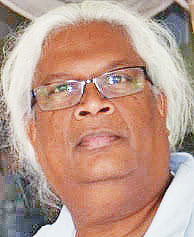Opinions
Kashmir revisited

The comments I’ve heard and read on the Kashmir situation since Modi’s action to cancel the special status, detain the heads of state, and impose central government – something similar to the British crown colony, or Guiana after the suspension of the first self-rule constitution in 1953 – have been both inaccurate and confused, with, at best, a cursory appreciation of the facts. Now Bernie Sanders, aspirant to the US Presidency, speaking to a roomful of US Muslims, has added his surprising, but very American ignorance, to the mounting verbiage; what a
disappointment; as he is influential and trusted. Most Americans know zilch about Asia, South or East; most couldn’t find their own hometown on a map, much less J&K or Peshawar. In the last issue of ICWorld, I noted that this problem began when the British soldier, Major William Brown, of Maharaja Hari Singh’s forces, mutinied to seize independent Kashmir for newly-formed Pakistan, following which, the Pakistanis invaded on Oct 22, 1947, and were repelled as noted. As war progressed, Indians accepted their British commander Roy Blucher’s restraints, but his opposite Douglas Gracey did not convince Pakistan to desist; this might explain some of the territorial gain by Pakistan in northern (Pakistan-occupied) Kashmir. The UN treatment of the issue was bungled, costing millions of lives and billions of dollars; its initial approach, Resolution 47, 1948, was afflicted by bias and incompetence and rejected by both countries. They were recommendations mainly, but the INC in India neglected to address the problem definitively; did they think it would evaporate?
What the UN and West, including intervenor Canadian General AGP McNaughton, have consistently downplayed was that Pakistan’s position as a foreign invader and usurper of the rights of Kashmiris was and remains neither moral nor legal, and a grave error to grant to Pakistan any natural rights in Kashmir; any question of Kashmir's legal accession to India is Pakistan’s red herring.
Pakistan and its terrorist minions are trespassers, plain and simple, and have no place in the internal affairs of another nation. Claiming that it represents J&K Muslim Conference, a splinter from Abdull.ah’s J&K National Conference, it has survived purely on Western, primarily US protection. Some Muslims allege atrocities against Muslims as an excuse for intervention. The major atrocities against Kashmiris so far are those committed by Pakistan-backed terrorists like Jaish-e-Mohamed and Lashkar-e-Taiba; PM Imran Khan, who asked Trump to intercede, must know this; everybody else does; the major atrocities have been against Kashmiri pandits (Hindus): nearly half a million chased from their valley homes into refugee camps in border states. India’s recourse under Article 370 was the imposition of Central rule. Now the external violence with its many cells in the state and elsewhere in India, can be systematically addressed, eliminated and the stage set for a return of normalcy and economic activities, after four decades of turmoil, perpetrated in the name of Wahhabism and Muslim supremacy.
Trump’s denial of Imran’s request should be followed by a second denial of further funding of Pakistan’s daily bills, its dissolute army, and ISI’s fomenting world terrorism in the arrogant belief in the primacy and finality of Islam.
Kashmir destabilisation is a classic of CIA (and sister group MI6, ISI, Mossad) methodology; it distracts the world, and covers up the true agenda of benefactor and beneficiary, America foremost. It illustrates the UK’s pro-Pakistan bias in the post-independence period, which allowed a British legate’s lie in the UN to sway the UNSC.
The Western media, screaming against India and following recently escalating anti-Hindu hysteria, fail to report accurately that the UN resolutions on Kashmir were recommendations, never orders; the UN had no jurisdiction in an Indian internal matter; it failed to condemn Pakistan for aggression against Kashmir on imaginary grounds of religious mistreatment; if so, then every nation could use this pretext to invade another.
Harping on a condemnation of a striving democracy, India, (PM Modi to be exact; Indians too are guilty of this religious bias), obscures Pakistan’s intolerant theocracy and bankruptcy. US bailouts keep it afloat, bristling with arms and experts, deferring/forgiving loans, while IMF wants an account of old loans and guarantees for new ones, and China keeps heavy giving in undisclosed amounts, criticising India by habit.
Pakistan has picked fights with all its neighbours, and internal dissension racks Baluchis, Sindhis and Pashtuns, all of whom would secede, to escape Punjabi hegemony. Clause 370 restricted what the Centre could do on a daily basis which it now promises: to build a strong economy, where all religions can prosper.
What the UN and West, including intervenor Canadian General AGP McNaughton, have consistently downplayed was that Pakistan’s position as a foreign invader and usurper of the rights of Kashmiris was and remains neither moral nor legal, and a grave error to grant to Pakistan any natural rights in Kashmir; any question of Kashmir's legal accession to India is Pakistan’s red herring.
Pakistan and its terrorist minions are trespassers, plain and simple, and have no place in the internal affairs of another nation. Claiming that it represents J&K Muslim Conference, a splinter from Abdull.ah’s J&K National Conference, it has survived purely on Western, primarily US protection. Some Muslims allege atrocities against Muslims as an excuse for intervention. The major atrocities against Kashmiris so far are those committed by Pakistan-backed terrorists like Jaish-e-Mohamed and Lashkar-e-Taiba; PM Imran Khan, who asked Trump to intercede, must know this; everybody else does; the major atrocities have been against Kashmiri pandits (Hindus): nearly half a million chased from their valley homes into refugee camps in border states. India’s recourse under Article 370 was the imposition of Central rule. Now the external violence with its many cells in the state and elsewhere in India, can be systematically addressed, eliminated and the stage set for a return of normalcy and economic activities, after four decades of turmoil, perpetrated in the name of Wahhabism and Muslim supremacy.
Trump’s denial of Imran’s request should be followed by a second denial of further funding of Pakistan’s daily bills, its dissolute army, and ISI’s fomenting world terrorism in the arrogant belief in the primacy and finality of Islam.
Kashmir destabilisation is a classic of CIA (and sister group MI6, ISI, Mossad) methodology; it distracts the world, and covers up the true agenda of benefactor and beneficiary, America foremost. It illustrates the UK’s pro-Pakistan bias in the post-independence period, which allowed a British legate’s lie in the UN to sway the UNSC.
The Western media, screaming against India and following recently escalating anti-Hindu hysteria, fail to report accurately that the UN resolutions on Kashmir were recommendations, never orders; the UN had no jurisdiction in an Indian internal matter; it failed to condemn Pakistan for aggression against Kashmir on imaginary grounds of religious mistreatment; if so, then every nation could use this pretext to invade another.
Harping on a condemnation of a striving democracy, India, (PM Modi to be exact; Indians too are guilty of this religious bias), obscures Pakistan’s intolerant theocracy and bankruptcy. US bailouts keep it afloat, bristling with arms and experts, deferring/forgiving loans, while IMF wants an account of old loans and guarantees for new ones, and China keeps heavy giving in undisclosed amounts, criticising India by habit.
Pakistan has picked fights with all its neighbours, and internal dissension racks Baluchis, Sindhis and Pashtuns, all of whom would secede, to escape Punjabi hegemony. Clause 370 restricted what the Centre could do on a daily basis which it now promises: to build a strong economy, where all religions can prosper.
Wondering about wandering back home
 Romeo Kaseram
Romeo Kaseram
It has come to that time in my life when the family is now thinking I am starting to show the signs of a wandering mind. It is not so, after all – not a wandering mind though, but a “wondering” one.
Of course, how am I to say it is not so without a lengthy explanation, which involves spelling out both words, with this leading not to elucidation, but to even further confusion in their wondering minds.
Of course, inevitably, after I have failed to convince them on either count between “wandering” and “wondering”, their conclusion now irrevocably beyond doubt, and surreptitiously conveyed
among themselves with that certain look in the eye, a shake of the head when I reach down for my cup of tea, and their eager agreement to everything I say afterwards. However, I know what they have all agreed to with those wordless exchanges. That I have lost my way, and soon, a reluctant family member will have to be delegated to hold my hand, and gently lead me to a park bench on mornings.
There I will sit out my days in the warm sunshine feeding pigeons broken pieces of dry roti, and cracking jokes only the birds will understand and laugh at, all the while fluttering wings appreciably, and bobbing their heads in agreement.
As one of my sons always says with finality, finishing off my conversations that seem to have no end to its circularity, “What to do?” This is how it ended with one of my latest spiels, my mind wondering about wandering away on vacations, not during the worst winter weather in our cold northern homes, but timing our trips to anticipate the seasons back home.
“Seasons? What seasons do you have back home other than the rainy and the dry?” a family member wondered, with eyebrows raised in concern about my internal health.
I could feel the concern rising throughout the rest of the room, feeding like warm yeast in soft dough, on whether I was leading the conversation back to another of those trying episodes where I unsuccessfully debated “wandering” versus “wondering”. Least to say, the narrowing eyes looking at me from a few relatives were filled with nothing less than wonderment.
However, mine was a simple thesis. Why head out to the tropics during the frigid grip of winter, avoiding the brutal cold grasp of sub-zero temperatures? Or leaving behind those awfully humid days in summer, when nothing but uninviting algae could be seen for kilometres on the surface of a warming lake? Instead, why not target the homeland during one of its many “seasons”?
Right away I had to respond to the eyebrows being quizzically raised around me, which were extending the receding hairlines on a few male relatives in the room. Now there were cups of tea motionless by lips glued with lipstick, the fine china frozen in midair, the extended pinkies twitching with tension.
I was compelled to act quickly after noting the frown spreading on faces like runny jam on toast, now that the anticipation of a savoury cucumber sandwich was interrupted, the morsel reluctantly being lowered back onto its saucer.
“Fruit seasons! There are many fruit seasons back home!” I said. The gasps of wonder, not at the revelation of such divine knowledge, but at the simplicity of the answer, was one of relief. Right away the room filled up again with bubbly slurps from lips on teacups; fresh cucumber crunched noisily between solid dentures; and a few spoons rattled dryly, without regard to diabetic strictures, against the rims of sugar bowls.
Perhaps my listeners were all chewing cogitatively on my revelation, given how quiet the room had become. I figured we were all in agreement, since there was nothing else to compare the coming to fruition of plump mangoes, soursops fattened with sunshine and rain, guavas eyed by flocks of kiskadees, finches, and blackbirds, and plums swaying on heavy branches in those heady days when I was growing up back home.
Well, to be fair, the silence in the room could also be due to family members with flourishing backyards here in the temperate north. There were a few among us who cherished the few sour backyard strawberries, the mere handfuls that ripened in July, always too few after the winter worry the patch would not survive each killing wave of frost.
We all knew from back home that to count the fruits on a tree was to blight the backyard crop. Yet each disappearance of an apple the next morning was quickly noticed after the count, the blame laid squarely with an evil eye on the chattering squirrels trundling across the neighbour’s fence like circus acrobats.
It proved to be a thesis that bore no fruit – no one responded to my plan to head to the homeland when the mangoes weighed the branches down, and the kiskadees made mayhem with the finches in the guava patches.
Each family member sipped happily, crunching noisily on cucumbers, totally oblivious to the wisdom falling from my lips. In my son’s words, “What to do?”
There I will sit out my days in the warm sunshine feeding pigeons broken pieces of dry roti, and cracking jokes only the birds will understand and laugh at, all the while fluttering wings appreciably, and bobbing their heads in agreement.
As one of my sons always says with finality, finishing off my conversations that seem to have no end to its circularity, “What to do?” This is how it ended with one of my latest spiels, my mind wondering about wandering away on vacations, not during the worst winter weather in our cold northern homes, but timing our trips to anticipate the seasons back home.
“Seasons? What seasons do you have back home other than the rainy and the dry?” a family member wondered, with eyebrows raised in concern about my internal health.
I could feel the concern rising throughout the rest of the room, feeding like warm yeast in soft dough, on whether I was leading the conversation back to another of those trying episodes where I unsuccessfully debated “wandering” versus “wondering”. Least to say, the narrowing eyes looking at me from a few relatives were filled with nothing less than wonderment.
However, mine was a simple thesis. Why head out to the tropics during the frigid grip of winter, avoiding the brutal cold grasp of sub-zero temperatures? Or leaving behind those awfully humid days in summer, when nothing but uninviting algae could be seen for kilometres on the surface of a warming lake? Instead, why not target the homeland during one of its many “seasons”?
Right away I had to respond to the eyebrows being quizzically raised around me, which were extending the receding hairlines on a few male relatives in the room. Now there were cups of tea motionless by lips glued with lipstick, the fine china frozen in midair, the extended pinkies twitching with tension.
I was compelled to act quickly after noting the frown spreading on faces like runny jam on toast, now that the anticipation of a savoury cucumber sandwich was interrupted, the morsel reluctantly being lowered back onto its saucer.
“Fruit seasons! There are many fruit seasons back home!” I said. The gasps of wonder, not at the revelation of such divine knowledge, but at the simplicity of the answer, was one of relief. Right away the room filled up again with bubbly slurps from lips on teacups; fresh cucumber crunched noisily between solid dentures; and a few spoons rattled dryly, without regard to diabetic strictures, against the rims of sugar bowls.
Perhaps my listeners were all chewing cogitatively on my revelation, given how quiet the room had become. I figured we were all in agreement, since there was nothing else to compare the coming to fruition of plump mangoes, soursops fattened with sunshine and rain, guavas eyed by flocks of kiskadees, finches, and blackbirds, and plums swaying on heavy branches in those heady days when I was growing up back home.
Well, to be fair, the silence in the room could also be due to family members with flourishing backyards here in the temperate north. There were a few among us who cherished the few sour backyard strawberries, the mere handfuls that ripened in July, always too few after the winter worry the patch would not survive each killing wave of frost.
We all knew from back home that to count the fruits on a tree was to blight the backyard crop. Yet each disappearance of an apple the next morning was quickly noticed after the count, the blame laid squarely with an evil eye on the chattering squirrels trundling across the neighbour’s fence like circus acrobats.
It proved to be a thesis that bore no fruit – no one responded to my plan to head to the homeland when the mangoes weighed the branches down, and the kiskadees made mayhem with the finches in the guava patches.
Each family member sipped happily, crunching noisily on cucumbers, totally oblivious to the wisdom falling from my lips. In my son’s words, “What to do?”
